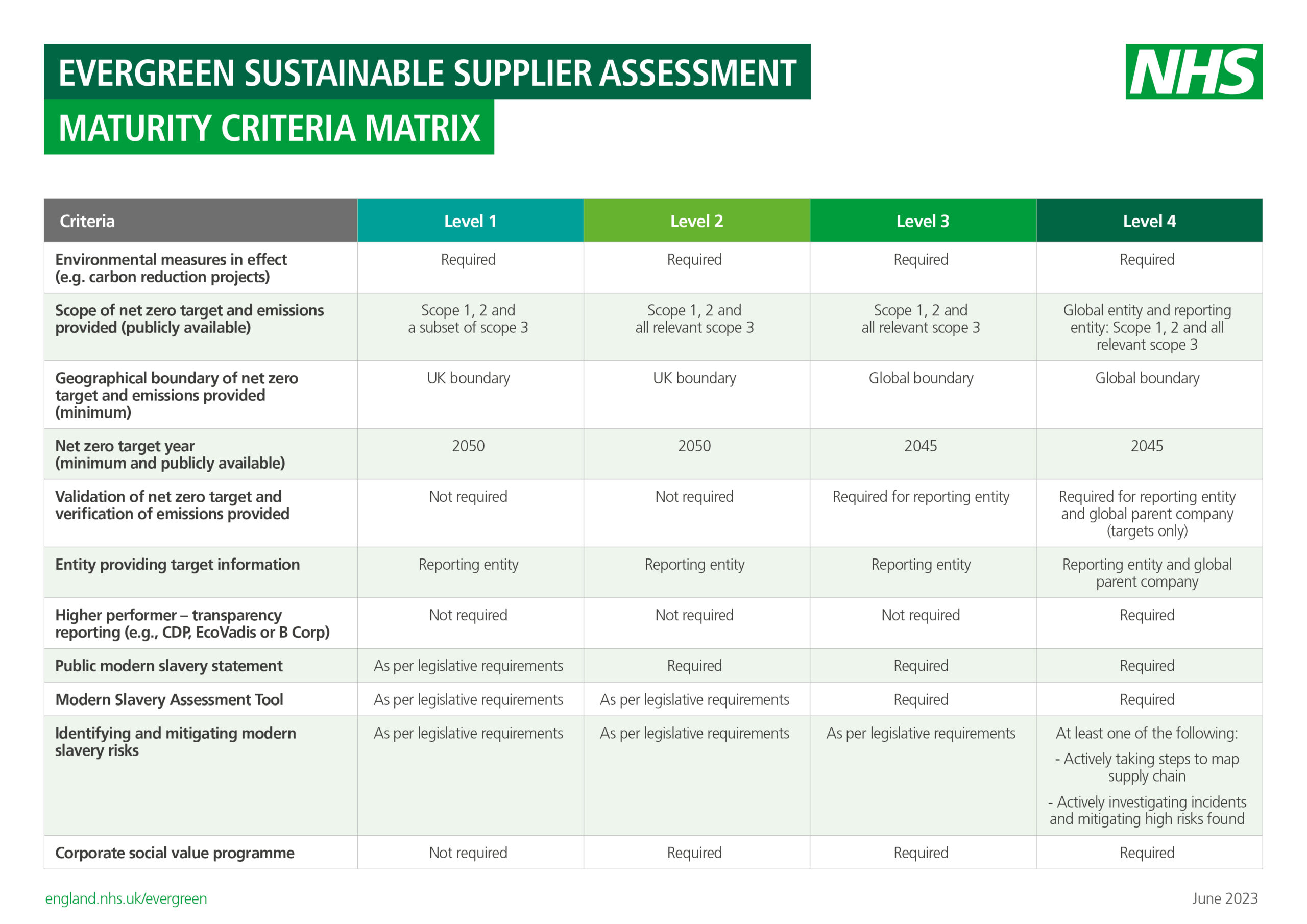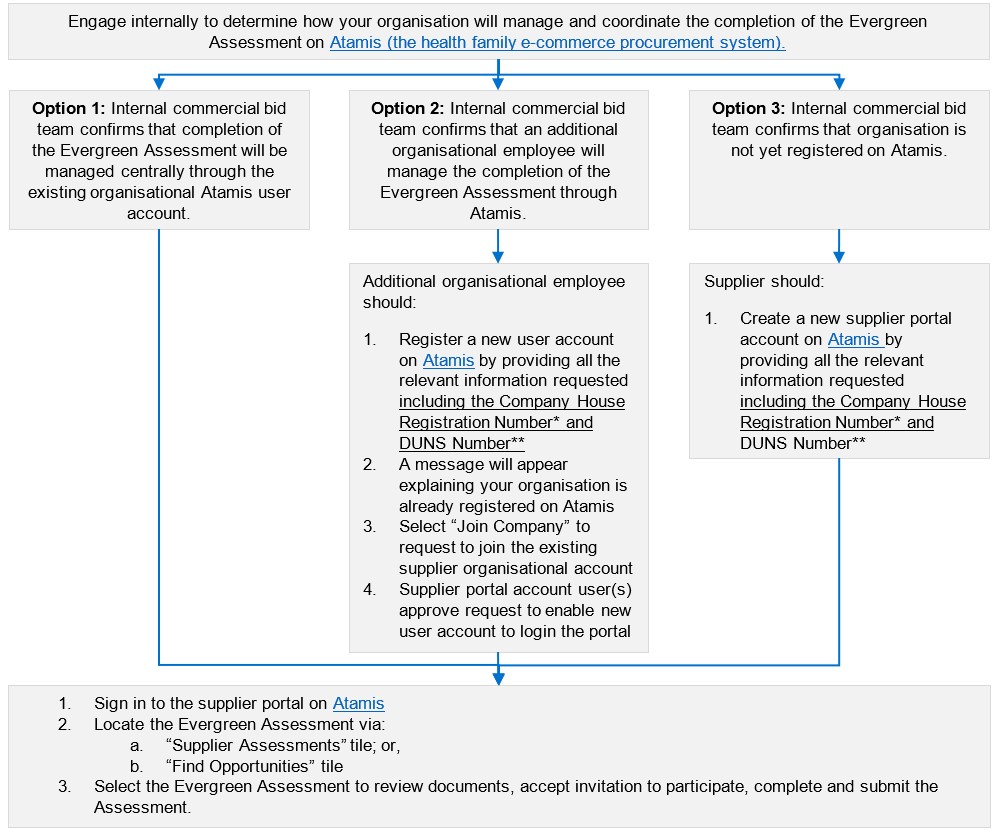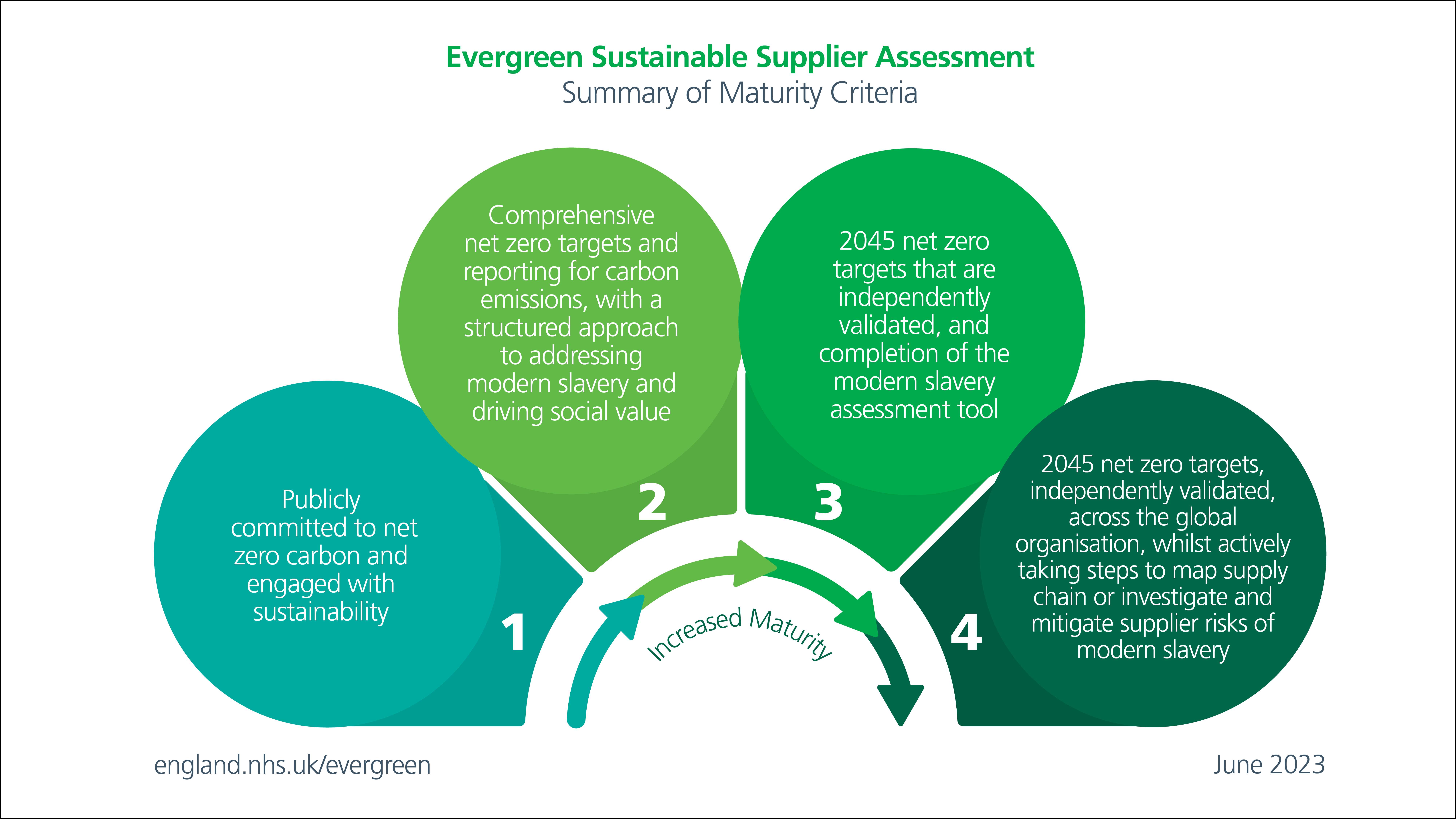Evergreen sustainable supplier assessment
The Evergreen Sustainable Supplier Assessment is an online tool which enables suppliers to engage with the NHS on their sustainability journey and understand how to align with the NHS net zero and sustainability ambitions, including those set out in the NHS net zero supplier roadmap.
Introduction to Evergreen
The Evergreen Sustainable Supplier Assessment is a self-assessment and reporting tool for suppliers to share sustainability information with the NHS, providing a single route for information and data sharing between suppliers and the NHS.
After completing the assessment, suppliers will receive a sustainability maturity score against NHS priorities, which signposts their current position and pathway to progress. The assessment has not been designed to be included as a scored or evaluated requirement in procurement. There are two exceptions which require completion of the Evergreen Assessment noted below:
| Exception | Requirement | Rationale |
| NHS Supply Chain Frameworks | Suppliers on existing NHS Supply Chain Frameworks: Submission of the Evergreen Assessment is required by 1 February 2024.
New NHS Supply Chain Frameworks: Suppliers bidding to be on any future NHS Supply Chain Frameworks will be required to submit an Evergreen Assessment as part of the tendering process. |
Historically, NHS Supply Chain has required suppliers to complete the Carbon Waste and Water Reduction Assessment (CWW) on the NQC platform. CWW is replaced by the Evergreen Assessment to ensure alignment across the NHS and remove duplication for suppliers. |
| NHS England Medicines Tenders | All NHS England Medicines tenders carried out by the Medicines Value and Access directorates will apply Net Zero and Social Value (building on PPN 06/20 – Social Value Model) by requiring submission of the Evergreen Assessment from January 2024.
More information can be found on the Specialist Pharmacy Service website. |
The mechanism through which medicines are procured does not allow for evaluation of tenders using the 10% net zero and social value weighting. Using the Evergreen Assessment as the implementation mechanism for Net Zero and Social Value in medicines tenders on an exceptional basis ensures that the policy is proportionate, aligned with the intent of the NHS Net Zero and Social Value approach and PPN 06/20. |
Benefits of using Evergreen
For suppliers:
- Benchmark against current and future NHS priorities – suppliers can see how they align to the NHS’s long-term sustainability priorities.
- One conversation with the NHS – Suppliers have a standardised way of communicating their sustainability information to all NHS buyers.
- Supports sustainability ambitions – Suppliers can use the assessment to help inform internal planning and decision-making, such as developing business cases for sustainable investment or global target setting.
For NHS organisations:
- Improved understanding of supply chain – Provides information that can improve trust/ICB understanding of their supply chain’s progress towards sustainability targets.
- One conversation with suppliers – Provides a central source for supplier sustainability information with maturity scoring aligned to the NHS Net Zero and wider sustainability priorities.
- Supports contract management – Provides information to inform contract management conversations with suppliers to promote alignment with the NHS sustainability priorities, in particular where emissions reductions form part of key performance indicators (KPIs).
Completing the Evergreen assessment
The assessment can be completed by any supplier which provides or plans to provide goods or services to NHS England, integrated care boards, or an NHS trust in England.
The Department for Health and Social Care and NHS systems in Northern Ireland, Scotland and Wales can also access the information and data. It is hosted on Atamis (the health family e-commerce procurement system) and all suppliers can access the assessment once they have registered with Atamis.
It is recommended that suppliers complete the assessment annually and the maturity score will be valid for 12 months. However, suppliers will be able to update their annual assessment with significant updates at any time throughout the year, where appropriate.
Suppliers should follow the instructions below to access and complete the assessment. Suppliers can ask questions or give feedback on the assessment via england.ccf-sustainability@nhs.net.
Instructions for suppliers
Engage internally to determine how your organisation will manage and co-ordinate the completion of the Evergreen Assessment on Atamis (the health family e-commercial system).
Option 1:
Internal commercial bid team confirms that completion of the Evergreen Assessment will be managed centrally through the existing organisational Atamis user account.
Option 2:
Internal commercial bid team confirms that an additional organisational employee will manage the completion of the Evergreen Assessment through Atamis.
Additional organisational employee should:
- Register a new user account on Atamis by providing all the relevant information requested including the Company House Registration Number* and DUNS Number**.
- A message will appear explaining your organisation is already registered on Atamis.
- Select “Join Company” to request to join the existing supplier organisational account.
- Supplier portal account user(s) approve request to enable new user account to login the portal.
Option 3:
Internal commercial bid team confirms that organisation is not yet registered on Atamis.
Supplier should:
Create a new supplier portal account on Atamis by providing all the relevant information requested including the Company House Registration Number* and DUNS Number**.
On completion of options 1-3
- Sign in to the supplier portal on Atamis.
- Locate the Evergreen Assessment via either:
- ‘Supplier Assessments’ tile
- ‘Find Opportunities’ tile
- Select the Evergreen Assessment to review documents, accept invitation to participate, complete and submit the Assessment.
* A company registration number is a unique code assigned to a company during the incorporation process. You can find your Companies House Registration Number (also known as Company Number) by searching the register here. In the United Kingdom, private limited and public companies must be registered with Companies House. Unlimited companies under certain situations also need to deliver accounts to Companies House. Please refer to the Companies House accounts guidance and Companies Act 2006 whether and when your organisation needs to be incorporated with a Company House Registration Number.
** A DUNS (Data Universal Numbering System) number, also known as a D-U-N-S Number or Dun & Bradstreet Number, is a unique nine-digit identifier for businesses. You can find a DUNS number for a UK company by searching the register here. In order to request an international DUNS number you can identify this via the local Dun & Bradstreet market via this page and subsequently searching the specific country register there. All registered businesses in the UK and Ireland are automatically issued a DUNS number. There is no charge to obtain a DUNS number. You can find more information here.
Evergreen maturity criteria
A supplier will be assessed against four maturity levels that indicate alignment with NHS sustainability priorities.
The maturity criteria are informed by leading, independent sustainability initiatives, such as the science based targets initiative (SBTi) and the modern slavery assessment tool (MSAT), as well as NHS sustainability requirements including those set out in the Net Zero supplier roadmap.
A summary of the maturity criteria is provided below and the detail associated with each level is provided in the supporting matrix.
 Maturity descriptors
Maturity descriptors
Level 1 (lowest maturity)
Publicly committed to net zero carbon and engaged with sustainability.
Level 2
Comprehensive net zero targets and reporting for carbon emissions, with a structured approach to addressing modern slavery and driving social value.
Level 3
2045 net zero targets that are independently validated, and completion of the modern slavery assessment tool.
Level 4 (highest maturity)
2045 net zero targets, independently validated, across the global organisation, while actively taking steps to map supply chain or investigate and mitigate supplier risks of modern slavery.
| Criteria | Level 1 | Level 2 | Level 3 | Level 4 |
| Environmental measures in effect (eg carbon reduction projects) | Required | Required | Required | Required |
| Scope of net zero target and emissions provided (publicly available) | Scope 1, 2 and a subset of scope 3 | Scope 1, 2 and all relevant scope 3 | Scope 1, 2 and all relevant scope 3 | Global entity and reporting entity: Scope 1, 2 and all relevant scope 3 |
| Geographical boundary of net zero target and emissions provided (minimum) | UK boundary | UK boundary | Global boundary | Global boundary |
| Net zero target year (minimum and publicly available) | 2050 | 2050 | 2045 | 2045 |
| Validation of net zero target and verification of emissions provided | Not required | Not required | Required for reporting entity | Required for reporting entity and global parent company (targets only) |
| Entity providing target information | Reporting entity | Reporting entity | Reporting entity | Reporting entity and global parent company |
| Higher performer – transparency reporting (eg CDP, EcoVadis or B Corp) | Not required | Not required | Not required | Required |
| Public modern slavery statement | As per legislative requirements† | Required | Required | Required |
| Modern Slavery Assessment Tool | As per legislative requirements† | As per legislative requirements† | Required | Required |
| Identifying and mitigating modern slavery risks | As per legislative requirements† | As per legislative requirements† | As per legislative requirements† | At least one of the following: – Actively taking steps to map supply chain – Actively investigating incidents and mitigating high risks found |
| Corporate social value programme | Not required | Required | Required | Required |
† Additional information on legislative requirements is provided on the Government website, including: PPN 02/23: Tackling Modern Slavery in Government Supply Chains
These are the maturity criteria as of June 2023; as sustainability initiatives evolve, the Assessment will take into account any changes required to reflect best practice, NHS priorities and feedback received. Suppliers that are in scope of net zero, social value and modern slavery legislative requirements will still need to demonstrate compliance through the procurement process – further information and guidance on associated requirements can be accessed via the NHS England » Central Commercial Function (CCF) webpage.


